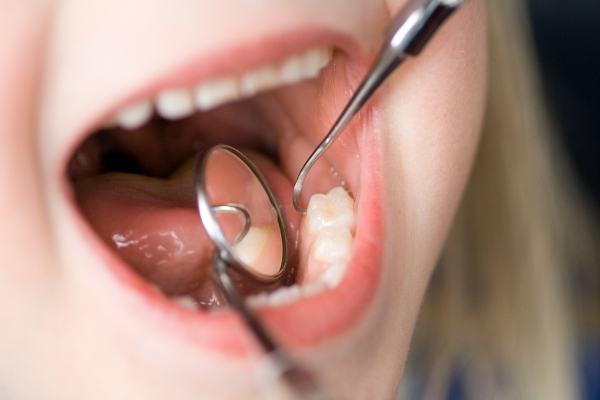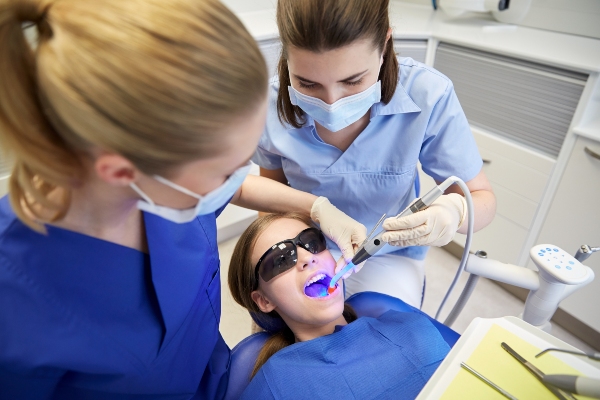 Pediatric dentistry focuses on diagnosing, preventing, and treating oral health concerns in children who still have their baby teeth. This review closely examines what parents and the pediatric dentistry team can do to protect baby teeth from cavities, dental trauma, and other forms of damage.
Pediatric dentistry focuses on diagnosing, preventing, and treating oral health concerns in children who still have their baby teeth. This review closely examines what parents and the pediatric dentistry team can do to protect baby teeth from cavities, dental trauma, and other forms of damage.
Pediatric dentistry: How to care for baby teeth (in-office and at home)
Caring for baby teeth should involve brushing and flossing regularly, limiting the consumption of carbohydrates, and regular dental cleanings. In addition, dental sealants and mouthguards are great preventive strategies to protect against cavities and dental trauma.
Brush and floss regularly
The simplest and most imperative way to protect baby teeth from cavities is to ensure the child brushes multiple times a day, or their parent brushes their teeth for them. It is also strongly encouraged to floss their teeth once daily. The pediatric dentist will provide information on how to brush and floss properly. Be sure to reach all areas of teeth to avoid cavities in hard-to-reach areas.
Limit the consumption of sugar
Sugar and other carbohydrates are notorious for their contribution to cavities. This is especially the case with baby teeth, as they are more prone to cavities due to their thinner layer of enamel. Subsequently, it is strongly encouraged to limit the consumption of sugar. Notably, it is best to stay away from sugar-filled beverages inside of a baby bottle as these can increase the likelihood of baby bottle tooth decay.
Regular dental cleanings
Dental cleanings are another great defense against cavities and teeth stains for baby teeth. Dental cleanings should occur every four to six months to help prevent an accumulation of plaque and tartar on the surface of teeth and along the gum line.
Dental sealants for molars
Dental sealants can help protect baby teeth from cavities in the most vulnerable areas, which are the chewing surfaces of molars and premolars. Sealants are plastic coatings that are safely and non-invasively placed in the office.
Wear a mouthguard
Pediatric dentists strongly recommend a mouthguard for children who play a contact sport or are physically active in other (potentially dangerous) ways. In addition, wearing a mouthguard helps protect in the event a blow to the mouth occurs, which could lead to one or more damaged, loose, or knocked-out teeth and the need for restorative treatment.
Check for signs of worn enamel
Lastly, during your child’s oral care routine each day, check their teeth for any signs of worn enamel (and teeth them how to check as well). If any concerns are detected, notify the pediatric dentist.
Our pediatric dentistry can help you protect your child’s baby teeth
You can reach our pediatric dentistry team to discuss your child’s oral health and schedule a visit. We help parents develop a cavity prevention plan for their child’s baby teeth. In addition to preventive and diagnostic services, we help restore baby teeth after issues such as cavities, teeth cracks, and more develop.
Request an appointment or call Grand Parkway Pediatric Dental at 832-579-0960 for an appointment in our Richmond office.
Recent Posts
Visiting a pediatric dentistry office with your child ensures his or her future relationship with oral hygiene and dentists, in general. Whenever your child suffers from oral injuries, consider making an appointment with your pediatric dentist to uncover any underlying problems. For instance, injuries to the tongue and teeth could indicate a deeper jaw or…
Fluoridated water is part of pediatric dentistry. It is a convenient and easy way to strengthen and protect teeth at an early age. Many areas have fluoridated water, which is a definite advantage. If you want to know why a dentist will likely recommend fluoridated water, here are the details.Studies show that almost all sources…
Nutrition is an important part of pediatric dentistry. Having balanced amounts of vitamins and minerals can strengthen and protect the teeth. Proper nutrients also fuel dental function. If you want to know how important nutrition is for your child’s oral health, here are the details from a pediatric dentistry professional.Children are still developing. They need…


